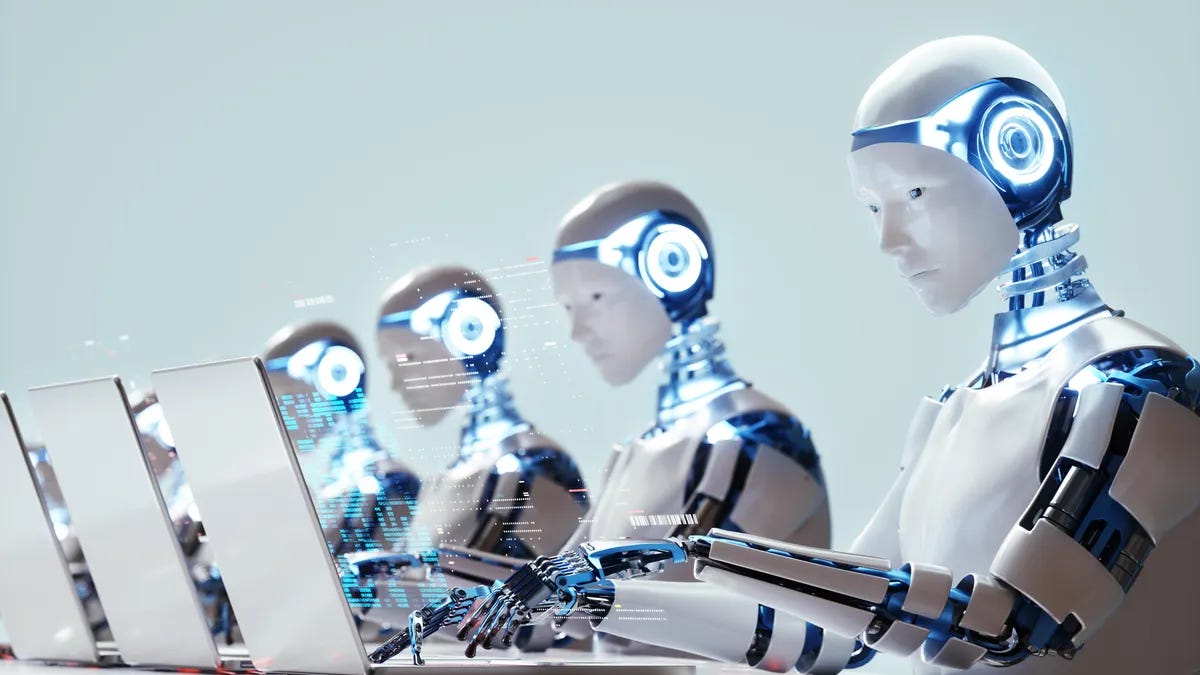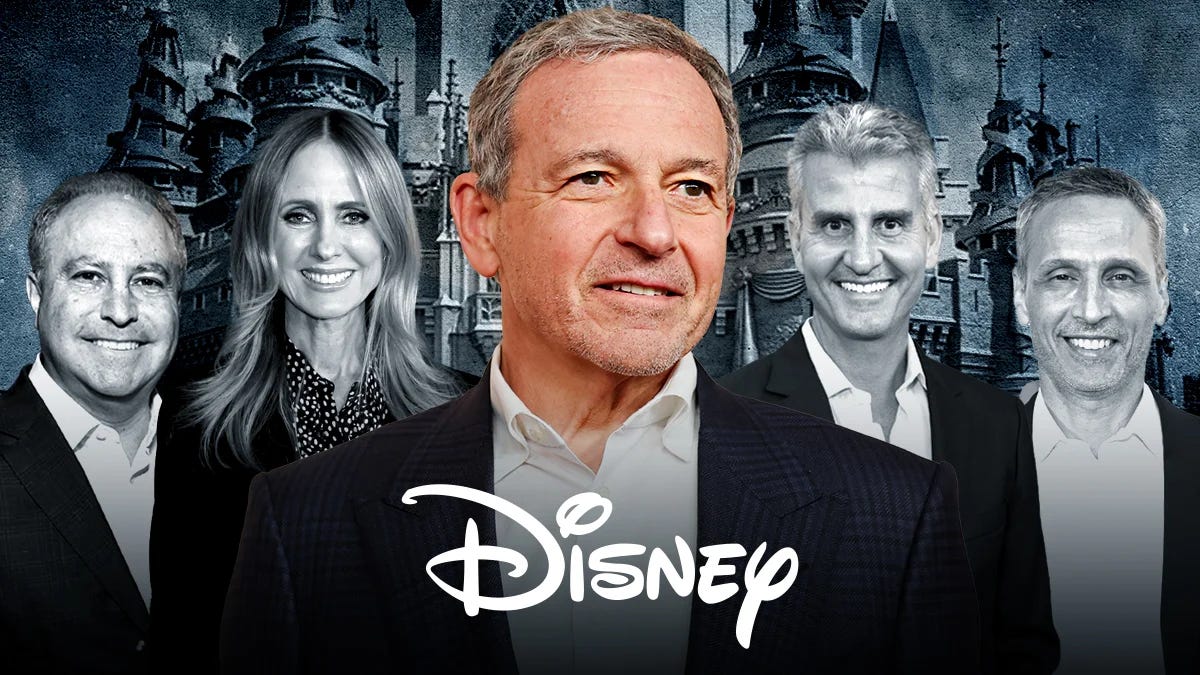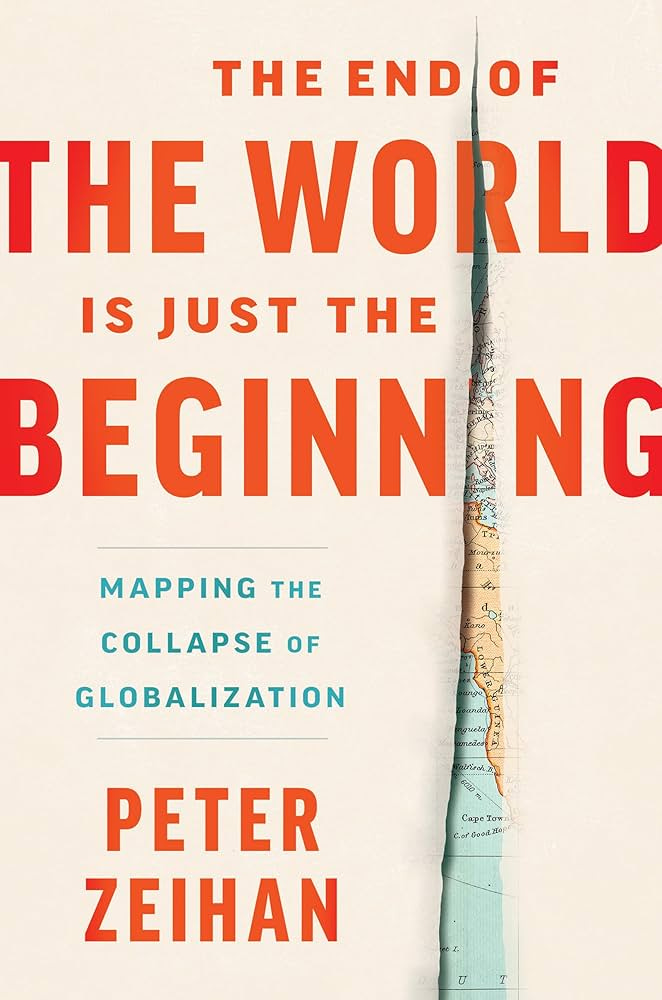AI Is Actually Creating Jobs
Plus, $50 Amazon gift card giveaway, Canada cuts rates, Disney CEO successor, Juul pays out $300 million, North Korea deploys troops in Russia and more.
Welcome to the 15 investors who joined us since the last Weekly Brief! If you’re reading on the web and haven’t subscribed, join 486 curiosity-driven, enthusiastic stock market-addicted mortals by subscribing here.
Good morning investors 👋,
Happy Friday and welcome or welcome back to the 50th Weekly Brief.
Giveaway time: Every ten weeks of the Weekly Brief, starting from Weekly Brief #40, I’ve been hosting giveaways of Amazon gift cards. As each tenth-week milestone of Weekly Brief is reached, the gift card amount will increase by $10. This week, you may have already realized that we’re now on the 50th consecutive week of Weekly Brief, meaning today marks the start of a $50 Amazon gift card giveaway!
The rules are simple (this time):
Subscribe to J. Nicholas.
Fill out this survey (helps with improving the content of this newsletter, and with improving relationships with potential advertisers and sponsors).
Then, wait patiently for Weekly Brief #51 next Friday to see if you won (the winner will be chosen using a random probability generator). Good luck!
Let’s get into it. (11 min read)
If you enjoy today’s issue, consider supporting me and my work by becoming a partner of J. Nicholas. I greatly appreciate it. Enjoy!
In this issue:
👩🔬 Wait, AI is actually creating jobs?
✂️ Canada cuts key benchmark rate
🇰🇵 North Korea deploys troops in Russia
FEATURED STORY

👩🔬 Wait, AI is actually creating jobs?
I know what you’re thinking, but the answer’s no, this is not an AI newsletter. Although it has heavily leaned towards AI topics lately, I assure you it isn’t. After my post covering the cloud computing giant’s push into nuclear power last week (here), I dove down an AI rabbit hole, putting myself in harm’s way (mentally) and facing the question of my entire existence and the potential of the world losing their jobs and the capitalistic economic system as we know it collapsing in front of my very eyes.
Turns out, that first part of that last statement is not entirely true.
Not everyone will lose their job to AI.
Because (1), it’s not economically sustainable. How are people going to purchase things from companies when those companies don’t provide people with an income anymore (since they don’t have jobs), and people aren’t spending money? Like I said above, that would collapse the financial system, and our world is driven by money, so that’s just not going to happen. And (2), because AI will actually lead to an increase in the job market too. Believe it or not, those media headlines were sort of misleading.
Cutting to the chase
From the rise of cloud computing and the huge demand for AI, (which I’ve covered in past posts here, here, here, and here, (still not an AI newsletter), comes a rise in demand in the job market. While it’s true that people will lose their jobs, only those with jobs consisting of low effort and high volume will be affected.
Here are (in my opinion) the two main job categories that will be hard hit by AI:
Retail workers
Cashiers
Shelf-stockers
Inventory management
Labelling workers
Assembly line workers
Packers
Low-level machine operators
Quality control
… These are just a few jobs, but these few jobs alone account for ~15% of the entire world’s workforce. These are jobs that require little qualification and can be done by anyone, including that of, robots and AI.
It’s what makes them so susceptible to technological disruption—it's easily replicable.
Even eventually higher-quality jobs like accounting, paralegal work, and potentially even radiologists and pathologists could be easily replaced by AI due to the accuracy AI provides and the precision needed for these specific jobs (and how cheap it costs to provide said precision). AI has no errors, and it does things quickly and efficiently. Imagine an accountant that you know will get things right 100% of the time (99.9% for a Murphy’s Law adjustment), and it costs you 90% less than hiring an accountant. It’s self-explanatory really.
People will go for the cheaper, more cost-efficient option.
Another thing is artists and writers/journalists—content jobs. These are easily replicable by AI even now, thanks to current image generation, text generation, and music generation models. Yet, what makes these careers unassailable isn’t the content itself is it? It’s the human touch. The enthusiasm. The passion. Having a hand-crafted painting compared to an AI-generated piece of art, or a book infused with enthusiasm and a indirect backstory of the author's life poured into words on a paper page, and a song written and performed by a talented artist who learned those skills—compared to words generated in seconds by an algorithm—just isn’t something that will thrive in this space. Sure, it's cheap and efficient. But is this something people want? Is producing vast amounts of content without any real connection, passion or human touch worth it? No, I don’t believe it is.
However, then come the careers that won’t just avoid disruption from AI but will soar in demand as AI development grows:
Blue-collar jobs.
Think of it: as artificial intelligence gets more complicated, and as these companies and the data centres they use to train their models grow larger and take up more energy, all of this energy needs to be managed. It can’t be done by AI—not today, not for a long time. AI is not that advanced. You need nuclear power plant operators, you need electricians, you need construction workers. You need blue-collar workers. You need blue collar workers. People with actual skills, providing solutions that can’t easily be replaced by a robot.
The world’s push to sustainability, and towards a more environmentally friendly Earth on all fronts, adds a jetpack to this job market. It’s why, as of now, of the projected highest-growing job sectors in the world over the next 9 years, the top two are related to energy conservation and maintenance—blue collar (and that’s just in the United States!). I can only assume this will grow even larger as AI continues to advance.

My honest thoughts, and it's a very simple argument: as data becomes a larger part of human society and as advancements in technology continue to progress, the amount of energy we need will grow. It’s a secular trend. The internet consumes a vast, extraordinary amount of data, and all that data is stored in data centres owned by cloud computing companies. These cloud computing companies use this data to train models that consume even more energy… so much energy that they need to start building, purchasing, and running nuclear power plants.
It’s almost dystopian to think about, but it’s the future:
Self-driving cars, robots running warehouses, and a world easily run by sentient beings that (hopefully) don’t kill us. In a few decades, give or take.
FINANCE

a. ✂️ Canada cuts key benchmark rate
Wednesday, the Bank of Canada cut its key benchmark rate by 50 basis points lowering the current rate to 3.75%, the bank’s largest move in over four years. The U.S. Federal Reserve has also begun a rate reduction cycle. (Canada’s inflation levels also fell to 1.6% in September.)
Economists anticipate another potential cut in December, with a majority of analysts predicting a 25-basis-point reduction and a 25% chance of a 50-basis-point cut. The bank also revised its GDP growth forecast for Q3 down to 1.5% from 2.8%, maintaining a full-year estimate of 1.2%.
b. 🚭️Juul pays out $300 million
In 2021, a class-action lawsuit was filed against Juul, the most popular e-cigarette (vape) brand. The lawsuit accused the company of misleading consumers about the addictiveness of its products and of marketing them illegally to minors. Because of the false claims, this supposedly led to consumers paying high prices for Juul’s products due to the lack of accurate information regarding their safety.
Then came the settlement of $300 million, and this week comes the payouts. Payouts range from a few hundred dollars to over $9,000 per person, depending on the number of receipts submitted. For those who smoke a vape for whatever reason, sadly, the claims deadline has passed, but the mere size of the payouts seemed worthy to mention. The court has yet to determine if any laws were violated.
Related articles:
BUSINESS

c. 🐭 Disney to name CEO successor
For the second time in what will be six years, Walt Disney is set to announce yet another CEO change to succeed Bob Iger in early 2026. This move is seen as a positive step for the company, which has struggled to find Iger’s replacement. As of late, Disney stock has been struggling, with investors putting the blame on leadership that led to losses in the streaming wars and major box office flops.
Management specifically has been a real struggle for Disney, with seemingly no clear direction on where the company is heading. As a first step, former Morgan Stanley executive chair James Gorman will become chairman of the board. Disney continues to evaluate potential candidates for the CEO role, including Dana Walden, Josh D’Amaro, Jimmy Pitaro, and Alan Bergman. But the top pick seems to be the former Morgan Stanley chair mentioned above.
Related articles:
d. 🍔 McDonald’s E. Coli outbreak
Throughout the week across the Western U.S. states, McDonald’s was hit with a deadly E. Coli outbreak thanks to the onions used in their Quarter Pounders. As of the time of writing, at least 49 people had been infected, with one death and ten hospitalizations, including one child.
A spokesperson confirmed the onions came from a single supplier processed at one facility before being distributed, the sole supplier for McDonald’s slivered onions, Taylor Farms, and has since recalled four raw onion products out of caution for potential E. coli contamination. They are currently urging all restaurants to stop using and dispose of the affected items. McDonald’s has taken Quarter Pounders off the menus in the affected area.
POLITICS

e. 🇰🇵 North Korea deploys troops in Russia
South Korea intelligence reported this week that North Korea has sent roughly 10,000 troops to Russia, with the U.S. later confirming that 3,000 are currently possible for deployment in Ukraine. According to the report, North Korea has deployed 3,000 of a promised 10,000 troops by December to Russia.
Ukrainian President Volodymyr Zelenskyy said that two units, at around 12,000 troops, are currently being trained for deployment. South Korea has demanded the withdrawal of the soldiers, and is considering providing aid to Ukraine in response. The U.S. State Department described the deployment as a “dangerous and highly concerning development,” with North Korea denying all allegations calling them “groundless rumours.”
If confirmed, this would mark the first direct involvement of North Korean forces in any conflict since the Korean War. But good news, experts believe a few thousand troops won’t significantly impact the war.
Related articles:
📚 Book of the Week
⭐️ For every book purchased using the links below, 80% of affiliate commissions are donated to charity.
Total donated to date: $30.00
Note: I don’t recommend books that I haven’t read or that I would never read. The books I recommend are books I have already read or that I will eventually read.
The End of the World Is Just the Beginning — Peter Zeihan
Book Description:
2019 was the last great year for the world economy.
For generations, everything has been getting faster, better, and cheaper. Finally, we reached the point that almost anything you could ever want could be sent to your home within days—even hours—of when you decided you wanted it.
America made that happen, but now America has lost interest in keeping it going.
Globe-spanning supply chains are only possible with the protection of the U.S. Navy. The American dollar underpins internationalized energy and financial markets. Complex, innovative industries were created to satisfy American consumers. American security policy forced warring nations to lay down their arms. Billions of people have been fed and educated as the American-led trade system spread across the globe. All of this was artificial. All this was temporary. All this is ending.
In The End of the World is Just the Beginning, author and geopolitical strategist Peter Zeihan maps out the next world: a world where countries or regions will have no choice but to make their own goods, grow their own food, secure their own energy, fight their own battles, and do it all with populations that are both shrinking and aging.
The list of countries that make it all work is smaller than you think. Which means everything about our interconnected world—from how we manufacture products, to how we grow food, to how we keep the lights on, to how we shuttle stuff about, to how we pay for it all—is about to change.
A world ending. A world beginning. Zeihan brings readers along for an illuminating (and a bit terrifying) ride packed with foresight, wit, and his trademark irreverence.
Thank you for reading today’s Weekly Brief! If you enjoyed or learned anything, please spread the word. (Remember, none of this is financial advice, please do your own research.)
— Jacob xx



